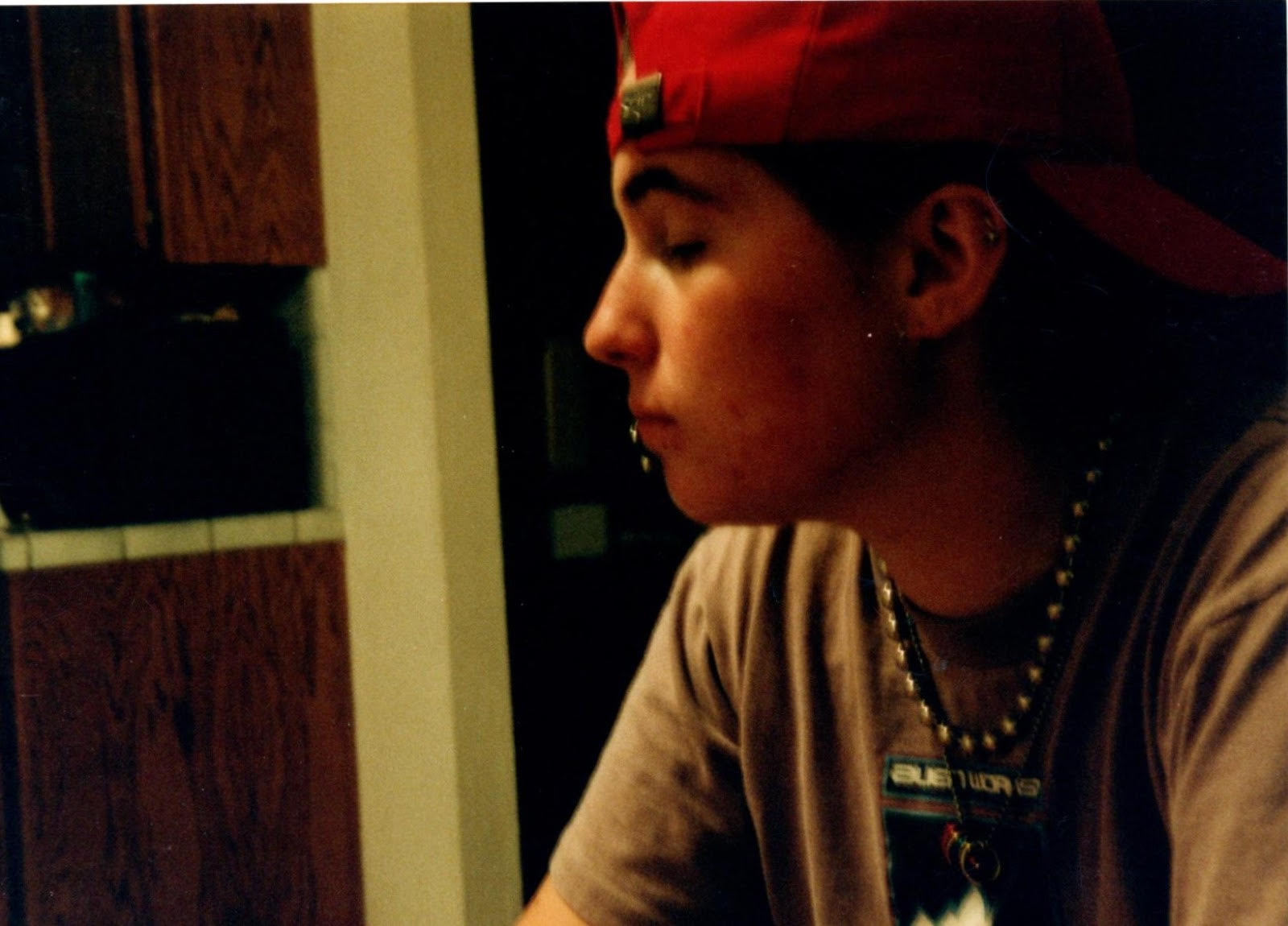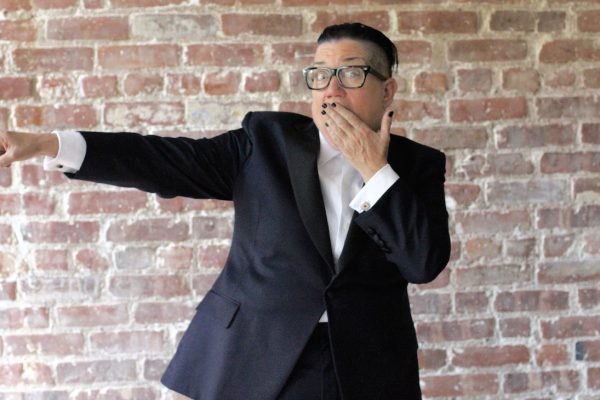They’ve been told to shut up, and threatened when they don’t. They’ve been ignored by mainstream “LGBTQ” media and organizations for years… Even told they don’t exist. They’re detransitioners. And many in the Detrans community have found empowerment through speaking up. Carol is one such voice — refusing to be made invisible, refusing to be treated like collateral damage.
JD Robertson: We saw a complete denial, in mainstream media, in particular ‘LGBTQ’ media, that detransitioners exist. Over the last several years, when detransitioners did speak up, through social media, they were ignored, censored, shouted down, and called names. On March 21, 2020, you wrote, “The best decision I ever made was to face myself as I was as I am and learn to love myself and my body. I’m happy I’m here as a lesbian woman. This is the first time I’m showing my face on Twitter because I do think detrans visibility is very important. #detransDayOfVisibility.” What was that moment like for you?
Carol: It may seem silly but it was a big moment for me. I felt I had been fighting the biggest battle of my life, and had come out victorious over something that people claimed no one could conquer… that thing being gender dysphoria. I wanted to show that I was a real woman. I wanted to especially show that I was a butch lesbian. I feel we have such little positivity around who we are.
And no real visibility either. Mainstream media has made a point of that. It’s great that you showed your face, like bam! And being in SF, ground zero as far as this is concerned, I’m sure you saw others go down the path of transition.
I’ve seen so many butch women transition, and I wanted to show that there was a way back.
What experiences, throughout childhood, being a teenager, and even in your young adulthood, played a role in the route you took?
Where to start? The thing about my gender dysphoria was that it was the tip of a huge iceberg that had been building my whole life. At the base of that iceberg was a very abusive childhood. I began feeling disconnected from my body at around 4 years old, when my abuse started. And this persisted throughout my life. This feeling of my body being this foreign object I was strapped into, fit the trans narrative very well. I felt uncomfortable in my body since I was a kid. I was a gender nonconforming child since I can remember— Throwing tantrums when I was forced to wear dresses… I wanted to dress in boys’ clothes, play with boys’ toys, and have all the fun the boys got to have. Because of this, my mother was very abusive to me. She would tell me I was walking, talking and acting “like a boy,” and I needed to act “like a girl.” This started when I was around 9 years old and continued through my life.
That’s terrible. Seems as though you were being conditioned, through abuse, to view yourself as ‘incorrectly female.’ Was there anything else that was unusual going on in your home life?
I was raised in a very religious house with strict gender roles, and a homosexual was the most disgusting thing you could be. You were an “abomination in the eyes of god” type stuff. Even outside of the religion, the atheists in my family were also very homophobic.
Did coming out as a lesbian, or diverting from the stereotypes of “femininity,” change things?
When I came out as a lesbian at 20 years old, I was told by my grandfather I was no longer welcome at family events because I could not be trusted around the children. I was very active in riding and training horses, and had a whole community I was involved in around that. When I came out, I was no longer welcomed in that community, especially when I began dressing more masculine… Some of the women I had been around wouldn’t speak to me anymore and didn’t want to be alone with me. I was framed as a predator.
How awful! I would imagine that the abuse you faced in childhood, and the alienation you faced in early adulthood, really impacted your sense of self. Was this childhood trauma carried over into adulthood?
All these things, I carried with me throughout my life. The self-hate was sometimes unbearable, and I battled with depression and suicidal ideation. I felt like I was fundamentally wrong, and when I heard about being trans in 2002, at age 22, it seemed to make sense and tick all the boxes of the way I was and felt.
And at 22, this is still several years before you would’ve reached full cognitive brain development. What was the catalyst, from that point in time, to the decision to go ahead with it?
In 2013 my life became chaotic. I didn’t want my abusive mother around my new child. I was ostracized from my family. Me and my wife lost a very close family member to suicide, and everything seemed to blow up. I felt like I wanted to die. I didn’t want to exist.
I can’t imagine being ostracized from my family, the impact that would have. Especially in moments when you’re in so much despair… Sounds like you were at such an unbearable and vulnerable point. What did that do?
My dysphoria became very bad, I struggled to go outside the house most days. I felt I needed to make a change or I would die. I thought that change was transition. I was still unsure however, so I found a therapist that I thought would help me sort it out. Unfortunately she did not. She only affirmed all my feelings about being “like a man,” or feeling like I was a man trapped in a female body. She never asked about my past: My childhood, my abuse, my depression, or anything. She just affirmed. And even at one point, when I was hesitant to start taking testosterone, told me to “just try it.” Well I did, and here I am now.
Wow. Unreal. The idea of being a “man trapped in a female body,” is a fairly prevalent idea when it comes to how lesbians, particularly categorically ‘butch’ lesbians, are perceived in larger society, in turn impacting self-perception. There’s a long history of categorically ‘butch’ lesbians being made into the ‘she’s really a man’ punchline on mainstream TV. Do you think that not seeing yourself represented in a positive light might’ve played a role?
It most certainly does. We don’t live in a vacuum. We interact with our world every minute of the day. Years of being looked at like a freak, made fun of, or downright threatened, takes its toll. Being called “sir” at least once a week, that public embarrassment, is something that was so hard for me to deal with. I hated that spotlight on me. For me, it was less about representation in the media, and more about the ways I was treated in my everyday interactions that was devastating. The looks, the comments, the disgust, it’s a hard life to walk through at times.
Almost two years ago now, detrans youth began asking, on Twitter, how they could go about taking legal action, and I answered, publicly, that you go after “informed consent.” I was then added to a group of DT youth to explain why (and was honored to be the only non DT person invited in). They actually renamed the group “Informed Consent.” Around the same time, you asked, on Twitter, “…how do you make a lawsuit stick when there is informed consent and gender affirming care?” and I responded “You argue that you can’t *actually get ‘informed consent’ from a kid who hasn’t reached full cognitive brain development…” Fast forward to last month. You added a great follow up question: “If that is the case, can you get informed consent from a person who is suicidal? Or clinically depressed?” In my opinion, there would be an issue of cognitive impairment (as it relates to informed consent) — something I touched on in a recent article. Talk to me a little bit about your follow-up question.
Yes, I have given this so much thought over the last 3 years. I know now that I was in a major depressive phase in my life when I went to see my therapist about transitioning. I had suffered a huge loss. I was suicidal. I had been diagnosed with a panic disorder. I don’t see how I could have made a very well-informed logical decision in that frame of mind. The thing is though, I was still functioning as an adult. I had a job. I was going to school and I was parenting. The depth of my mental illness was not easily seen by others, or even myself. I hide my distress well, I’ve been told, a learned adaptation from an abusive childhood, I believe. It would have taken an in-depth mental health evaluation to discover these things, to bring these things to light, even for me. If you’ve lived in a cave your whole life, how do you know there is sunshine outside? But no evaluation was required, or given, even when I tried to have one done myself. The affirmation model dictated that to challenge me, in any way, once I said those magic words, “I’m trans,” was out of the question. In my opinion, if transition is a medical treatment, then it needs to be treated the same as any other medical treatment. There needs to be thorough evaluation, diagnosis and alternative methods of treatment offered to the patient. For example, I have responded very well to antidepressants. Being put on them was a big turning point in my life, and a big factor in my detransition.
So there was no evaluation, no pause, no one even trying to look into potential underlying issues. In retrospect, how do you feel this should have been handled by the medical community?
I believe that all medical treatments should start with the less invasive first, and exhaust all options before the most extreme treatment. Gender dysphoria should be no different.
Do you feel as though you’d like an explanation as to why the medical field handled you as they did?
I will never have my body or mind back the way it was before I transitioned. And I demand to know why I wasn’t given an alternative route to health.
Carol, like so many others, wants answers. You can follow Carol on Twitter, where she clears her throat chakra on the daily!




